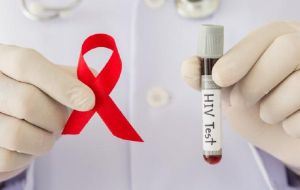MercoPress. South Atlantic News Agency
World AIDS Day 2018, “Know your status”, celebrates 30th anniversary
 Over 30 years ago, in 1986, WHO first evaluated rapid diagnostic tests for HIV. During the intervening decades, HIV testing services became widely available
Over 30 years ago, in 1986, WHO first evaluated rapid diagnostic tests for HIV. During the intervening decades, HIV testing services became widely available World AIDS Day 2018 will be commemorated on Saturday December first under the global theme “Know your status”. The occasion also celebrates the 30th anniversary of World AIDS Day, first initiated by WHO in 1988.
Over 30 years ago, in 1986, WHO first evaluated rapid diagnostic tests for HIV. During the intervening decades, HIV testing services became widely available – routinely through clinical settings and to higher-risk populations through community-based approaches. By 2017, 75% of the people estimated to be living with HIV (28 million out of 37 million) had accessed HIV testing and been diagnosed.
Nevertheless, important testing gaps remain. WHO and partners recommend the use of self-tests as an additional tool to overcome these gaps. WHO first recommended HIV self-testing in December 2016. Today, more than 59 countries have policies on self-testing, with 28 of countries fully implementing the policies.
The “Know your status” theme should also go beyond HIV services. People should not test positive for HIV and receive treatment, only to die of TB, due to poor access to TB diagnosis among people living with HIV.
Approximately 1 in 3 deaths among people with HIV is caused by TB. And around 5 million people are living with both HIV and viral hepatitis, with most of these people unaware. Further, non-communicable diseases, such as heart disease, affect at least 1 in 3 people living with HIV.
On its 30th anniversary, the World AIDS Day campaign reminds us that we should not become complacent in our response to HIV. Nearly half of the people living with HIV still lack access to treatment and have unsuppressed infections. The future success of the HIV response requires us to look beyond HIV care and empower better linkages with broader health care. Doing so can help people with and at risk of HIV access the care they need – be it for TB, mental health, hepatitis or another disease. This strategy can help the world get on track to not only end HIV, but also achieve “health for all” by 2030.




Top Comments
Disclaimer & comment rulesCommenting for this story is now closed.
If you have a Facebook account, become a fan and comment on our Facebook Page!